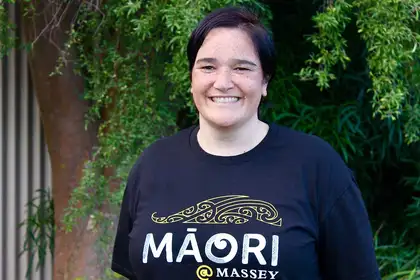
Newly appointed director of Māori student success Naomi Manu.
As the first cohort of Massey University’s highly-successful Pūhoro STEM Academy look forward to entering the tertiary sector from the end of the year, programme director Naomi Manu, Rangitane ki Wairarapa/Ngāti Kahungunu ki Wairoa, is one step ahead of them.
Ms Manu has been appointed the director of Māori student success, a role that will see her working to ensure all Māori students have the best possible experience and academic outcomes at Massey University.
Tackling challenges head-on is nothing new for Ms Manu. Only four weeks after joining the University in 2015, she pitched the idea of a science, technology, engineering and mathematics (STEM) academy for Māori secondary pupils to provide a long-term skills pipeline from secondary school, through tertiary and into employment.
“I had always been passionate about STEM education and very passionate about the fact that we need a deliberate strategy around how we improve that for our rangatahi Māori, so I figured I’m at Massey, we have resources that can support the secondary sector to improve that pipeline and we just built it from there,” Ms Manu says.
Three years later the Manawatū based programme is the most comprehensive indigenous STEM programme in the world. Pūhoro has spread to Horowhenua, Bay of Plenty and South Auckland, with 430 pupils across years 11-13—and it is changing lives. “The thing that is so wonderful is that 75 per cent of our rangatahi before this programme were not on an academic pathway, so not only have we got them on an academic pathway, but they are exceeding expectations around their capability.”
Through weekly tutoring, intensive workshops with Massey’s College of Sciences and exposure to science in industry and employment, the results have been remarkable.
Pūhoro has seen NCEA pass rates that equal or exceed non-Māori rates, completely changing the trajectory of its pupils’ lives. “For example, we’ve got one girl who had no idea how passionate she was about the environment and from a kaupapa Māori perspective around kaitiakitanga. She didn’t know anything about that before Pūhoro and now she is going to do an environmental science degree. What we’re doing right here and now is going to disrupt their lives in a really positive way – not just for them, but their families and eventually across the sector and their iwi."
Such success comes with poignancy. “It’s also really sad actually, because when you think we only have 430 pupils that we’ve changed the academic trajectory for, imagine all the other rangatahi that are on non-academic pathways that should be. It’s really sad.”
From the programme’s triumphs, it’s hard to imagine how difficult it was to get people to buy into Ms Manu’s vision. “I had all sorts of people say ‘that’s not how we do things around here Naomi’ and a lot of negativity around how lofty it was, but at the same time, things like that only made me want to push it more. I just really felt that this could provide so many opportunities for our young people. There were heaps and heaps of knockbacks.”
Ms Manu credits having the right people involved at the right time and getting Our Land and Water National Science Challenge and Te Puni Kōkiri on board as major sponsors as key to getting the programme off the ground; but funding is still a problem and Pūhoro is not yet financially sustainable. “We turn people away twice a week because we just can’t afford to have more people in.
That desire for Pūhoro to grow is the new focus for Ms Manu. “If we’ve got something that could make a difference for young Māori and provide more opportunities for young Māori, I think we have an ethical obligation to share that and ensure as many as possible can access it.”
Her mission to make Pūhoro financial sustainable and accessible will see Ms Manu hold onto overall responsibility for Pūhoro, even as she takes on oversight of Te Rau Tauawhi Māori Student Centre within the University’s Office of the Assistant Vice-Chancellor Māori and Pasifika, along with broader student success strategies.
“I would like to see a really successful energetic Māori student learning community at every campus and that also includes across our distance programmes. I think we need to create an environment that provides Māori students with a sense of belonging and a commitment to each other on this learning journey as well.”
She says she’s excited to work with Assistant Vice-Chancellor Māori and Pasifika Dr Charlotte Severne and other members of her office. “I think there’s a real opportunity, in particular under Vice-Chancellor Professor Jan Thomas’ leadership. There’s an appetite for change and having leadership from the likes of Jan and Charlotte is really exciting as well.”
Ms Manu says Massey’s Tiriti-led strategy is another huge opportunity. “This isn’t about one group getting more than another – it’s about ensuring our rangatahi Māori are empowered and have the same opportunity as other New Zealanders. It’s important people understand that Māori need to advance themselves in a uniquely Māori way because if we deny Māori as a treaty partner, that opportunity, we are in effect advancing one dominant culture and ultimately continuing the process of colonialisation.”
Ms Manu is looking forward to developing a Māori student success strategy in conjunction with Māori students and staff and, if past efforts are anything to go by, she will be a force to be reckoned with. “I like to be disruptive because I think we have the potential at Massey to do remarkable things and I would like us to think outside the box, try new things and disrupt as much as we can and get the results.”